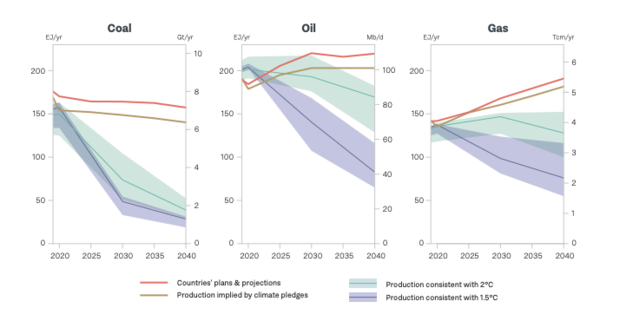U.N. finds that governments are still planning to increase oil and gas production despite climate warnings
Limiting global warming to 1.5°C is vital to reducing the risk of catastrophic natural disasters and weather events. Global leaders have spent months committing to make this happen, but on Wednesday, the United Nations released a report showing that their actions are falling short.
The 2021 Production Gap Report compares government's plans for coal, oil and gas production to the levels required to limit warming under the Paris Climate Agreement. Researchers looked at 15 major producers of fossil fuels, including Australia, Brazil, Canada, China, Germany, India, Indonesia, Mexico, Norway, Russia, Saudi Arabia, South Africa, the United Arab Emirates, the United Kingdom, and the U.S.
They found that most of these governments have significant policies in support of fossil fuels, and that many are planning to increase their production. These 15 countries, the report found, are planning to produce roughly 110% more fossil fuels in 2030 than what can be done to limit global warming to 1.5°C. The projected production levels are 45% higher than what's needed to limit warming to 2°C.
The burning of fossil fuels is one of the main contributors to human-caused climate change. The activity has increased the atmospheric concentration of carbon dioxide, which is one of several greenhouse gases that trap heat within the atmosphere, warming the planet over time.
If the Earth warms 1.5°C compared to pre-industrial levels — which we are expected to hit in the 2030s — the U.N. has warned the world can expect "extreme events unprecedented in the observational record," including disastrous heat waves, precipitation, droughts and cyclones that impact billions of people worldwide. And if global warming hits 2°C, it will only get worse.
In an August report, the U.N. warned that to maintain the 1.5°C threshold, the world can only emit another 400 gigatons of carbon, which is expected to happen in 9 years or less without changes. To stay below 2°C, humanity can only emit 1,150 gigatons of carbon.
Of the three main fossil fuel sources — coal, oil and gas — only one, coal, is projected to decrease over the next 20 years, Wednesday's U.N. reported found, but just modestly. With governments' current fossil fuel production plans, in less than 9 years, there will be roughly 240% more coal, 57% more oil and 71% more gas being produced than what is needed to limit global warming to 1.5°C, the report said.
All of these outputs, the report found, are well above what was implied by the government's climate pledges. G20 countries, for examples, have directed roughly $300 billion in new funds toward fossil fuel activities since the pandemic began last year, the U.N. said, which is more than they've allocated toward clean energy.
The U.S. is projected to engage in over 5% more fossil fuel production in 2030 compared to 2019 production levels. According to the Environmental Protection Agency, the burning of fossil fuels for electricity, heat and transportation was the largest source of greenhouse gas emissions in the U.S. in 2019. This year, people in the U.S. are expected to increase their coal usage for the first time in seven years.
"The research is clear: global coal, oil and gas production must start declining immediately and steeply to be consistent with limiting long-term warming to 1.5°C," said Ploy Achakulwisut, a lead author on the report. "However, governments continue to plan for and support levels of fossil fuel production that are vastly in excess of what we can safely burn."
The report urged governments to strengthen measures to reduce fossil fuel production.
Iger Andersen, executive director of the U.N.'s Environment Programme, said governments "must step up" and take "rapid and immediate steps to close the fossil fuel production gap."
"The devastating impacts of climate change are here for all to see," Andersen said. "There is still time to limit long-term warming to 1.5°C, but this window of opportunity is rapidly closing."




